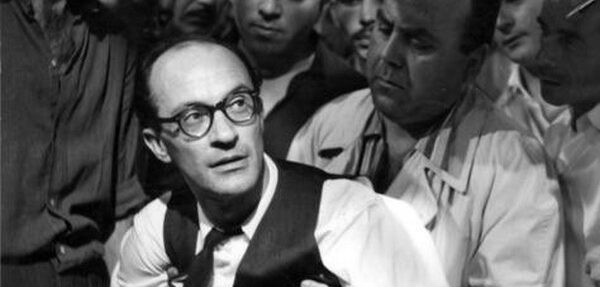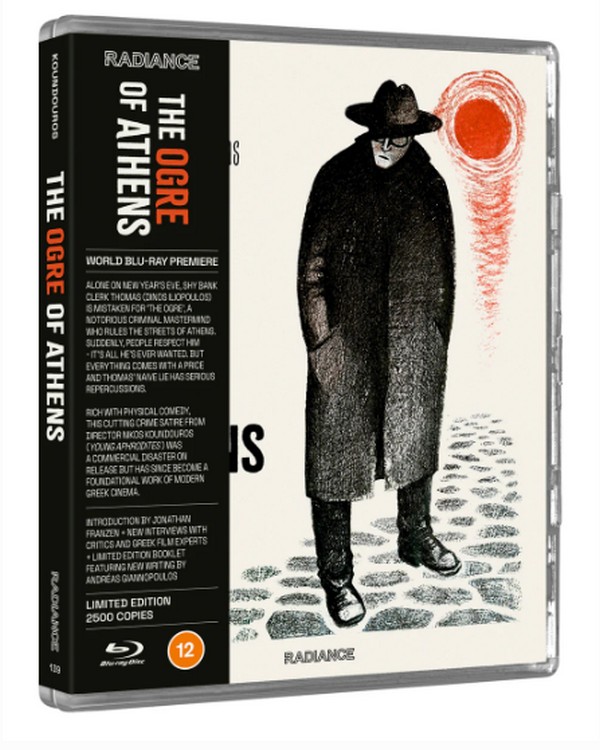 A mild-mannered bank clerk is mistaken for a dastardly criminal in the 1956 Greek film from Nikos Koundouros; on Blu-Ray for the first time via Radiance Films.
A mild-mannered bank clerk is mistaken for a dastardly criminal in the 1956 Greek film from Nikos Koundouros; on Blu-Ray for the first time via Radiance Films.
The Film
The Ogre of Athens, written by Iakovos Kabanellis and directed by Nikos Koundouros, is a fascinating piece, a post-war European artifact of the times and its cultural outlook. While originally a critical and commercial failure (it had the fewest tickets sold of Greek films in Greece in 1956), it has since been reappraised as an important film (perhaps the most important as it was voted “ in Greek cinema, highlighting shifting attitudes and the life of Greece of the fifties in ways the audience wouldn’t want to put thought to then. What struck me immediately was a comparison to Italian Neorealism —the films of Rossellini, De Sica, and De Santis. Melodramatic, but true to life, of the lives of people struggling in the new world of reconstruction after World War II and fascism. The matter-of-fact, straightforward nature of characters, scripting, shooting, and plotting is reflected in the Greek The Ogre of Athens as well. It’s a mistaken-identity film, not a wrong-man thriller.
The film draws the viewer in with a solid character piece, following Dinos Iliopoulous as Thomas. It’s New Year’s Eve, and as he closes up his day as a bank clerk, the newspaper and police release a photo of a Harry Lime-type criminal, known for stealing pensions and orphanage money, terrorizing Athens. Trouble is, “The Dragon” or “The Ogre,” depending on the person, looks almost exactly like Thomas. Mild and meek, Thomas doesn’t quite know what to do with this, so he does just as he always does: put his head down and see what happens. He’s the type to go along with whatever is happening, bringing a strange subject to follow as he’s not dynamic; he’s someone everyone will react to his quiet blankness, not unlike Peter Sellers in Being There, only far more aware.. Thus setting the stage for a light comedy of manners, character discussion, and misunderstandings, and, at the time, prescient social commentary.
As he heads home, rejected by his landlord and thus back out into the streets, he wanders through a club with ties to the criminal underground. With everyone assuming he is someone he is not, there’s a dynamic of the conversation; he, a mild-mannered trod upon guy, and them, willing criminals or women wanting away from this life. I appreciated the level of writing Iakovos Kabanellis and director Nikos Koundouros take with it, fitting the character; while he’s not telling them “that’s not me,” he’s not jumping into the new role, just sliding through. You gotta admit, if you’re a meek guy, usually trampled and ignored, when men suddenly respect you and women are attracted to you, perhaps you go for it. But it never betrays his character; he doesn’t become a firebrand now that he has power. He just has a little more of a character to chew on, since he admits he’s a little of a blank.
Some aspects of the film may be lost in time and translation. Much of the film is talky the back and forth. Kabanellis has strong writing and character, so it was great to listen, but I feel this may have been laced with a sort of social critique that would speak more to a Greek in 1955 living in the situation than an American in 2025 without too much context (but the special features, watched after, did shine more light). Koundouros shoots in the film from Thomas’s point of view to great effect. The way the characters are lit in shadow and light, with a darkness until known, and a confusion when needed. Character and camera work in tandem in beautiful ways.
I was glad to dig into an example and artifact of Greek cinema, an area I’m not too familiar with. As a fan of the mentioned Italian Neo-Realism, I liked looking into similar but of a different country and outlook. A fascinating film with a good lead in Iliopoulous, playing the meek very well, finding the balance of the introverted but still popping on screen.
The Disc
Package
Radiance presents The Ogre of Athens in a single-disc Blu-ray package. The hardcase contains a reversible sleeve with artwork based on the original posters. Within is a booklet with essays and a selection from Jonathan Franzen’s Freedom, referencing the film. It has a spine number of 139 and a limited run of 2500 copies.
Video & Audio
For The Ogre of Athens’s first time on Blu-ray, it looks great, mostly. The transfer has a crispness and clarity for the overall original budget of the production. Some artifacts remain, such as vertical lines on the screen. These aren’t distracting, and I get it’s part of how the prints have been kept for seventy years. The audio is only in Greek, in uncompressed mono. It has a continuous hum running across the picture. Changing my settings didn’t shift it, and as I don’t hear it on anything else on the disc, it’s the film itself. This might bother some folks. The subtitles are English only and newly translated.
Special Features
All features are new to this release.
Introduction by Jonathan Franzen (7m) The author talks about how The Ogre of Athens is one of his favorite and most influential films. Set a good level of what I was about to watch without giving it away.
Interview with film critic Christian Newland (11m) A reflective, specific look at the film, giving some of the depth and context I needed and appreciated.
Interview with Greek film expert Dimitris Papanikolou on the ‘Golden Age’ of Greek cinema (26m) – This I really dug. I appreciated seeing the wider picture of Greece and its film cycle before and after Ogre of Athens, giving further context and understanding of its contemporaries. As often is the case, I wrote down a bunch of new flicks to try to catch!
Final Thoughts
The Ogre of Athens LE from Radiance is a smaller but important release. It’s good to keep the spotlight on important films of historical context and national reflections. As a film fan, I love finding corners I’ve not explored much myself. The more knowledge the better, especially to spend on the medium as a critic. I thank Radiance for continuing my education; may it never stop.

